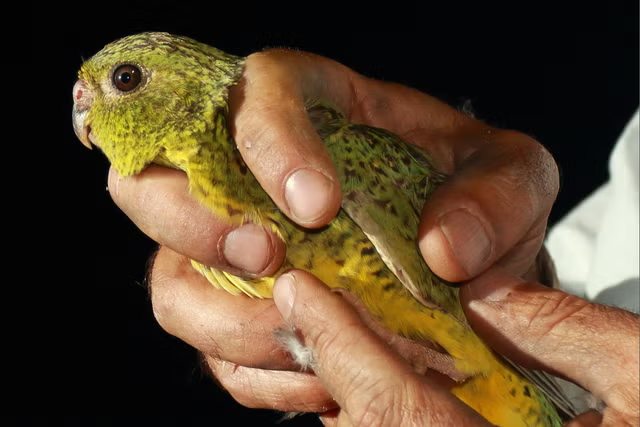Octopuses, long considered solitary creatures, are now engaging in complex, cooperative hunting behavior with fish, displaying shared leadership and sophisticated teamwork, according to a new study published in Nature Ecology & Evolution.
The research shows how octopuses and multiple fish species work together in hunting packs with remarkable success when feeding on mollusks and crustaceans. Each species takes on specialized roles to maximize its collective success.
Eduardo Sampaio and his team conducted scuba diving expeditions in the Red Sea, tracking and observing 13 hunting groups, including a day octopus (Octopus cyanea) and several fish species, such as goatfish and groupers.
"We were surprised at how sophisticated these groups can be," Sampaio told Newsweek. "Because they are not only cooperative or competitive, this creates a gradient in the group that depends on the membership and behavior of each individual in the group."
Day octopuses are common in tropical reefs from Hawaii to East Africa and can grow to almost three feet long, according to Monterey Bay Aquarium. Their name comes from their daytime hunting patterns, which are unusual for an octopus as most species hunt at night.
Once it has caught its prey, usually crabs and clams, the octopus kills it using venom secreted from salivary glands and then cracks its shell with its sharp beak.
Day octopuses have to be quick learners. Their typical life span is just one year, and they will only breed once in the time.
By tracking the three-dimensional movements of the crack hunting team in 120 hours of footage, the researchers found that the dynamics within these groups were far more complex than previously thought. While it was once assumed that the octopus led the hunt, the study reveals that leadership is shared across species, with different animals contributing unique skills to the group.
Fish, particularly goatfish, were responsible for environmental exploration. Based on their sensory abilities, they decided where the group would move. Meanwhile, the octopus determined if and when the group would initiate the next move, using its intelligence and dexterity to capitalize on the fish's findings.
"One can think of these different roles as initiators and deciders. Several species initiate movement, exploring the environment and providing different options," Sampaio said.
"The octopus then decides which option to take, dragging the whole group with it. Very rarely does the octopus initiate movement towards a new location."
According to the researchers, this form of shared decision-making reflects a new understanding of leadership in multispecies groups, where both stimulating and inhibiting movement can shape group behavior.
"This seemingly non-social invertebrate flexibly adapts to heterospecific actions, showing hallmarks of social competence and cognition," the researchers wrote in the study.
The team observed how group composition influenced the behavior of individual species. For instance, certain fish would invest more effort into guiding the group when partnered with an octopus.
This collaboration also triggered "partner control mechanisms," with octopuses sometimes punching fish to position them or assert dominance. Despite these occasional moments of aggression, the groups worked together efficiently, increasing their hunting success compared to when octopuses or fish hunted alone.
Sampaio added: "Aggression between partners indicates exactly that there are asymmetries in pay-offs and effort. Thus, we see that fish that contribute very little to the movement of the group and in creating prey opportunities get punched much more often than other fish.
"Moreover, we see that when the group is stationary around the octopus, that too stimulates aggression, and the octopus punches to release this negative feedback. Conversely, when the group is moving and creating prey opportunities, there is very little aggression between individuals."
One important detail about the aggressive punches is that they're monodirectional, meaning the fish never try to displace the octopus. Sampaio suggested this is not because the octopus is stronger than the fish but because the fish depend on the octopus to "flush out" prey from crevices.
Interestingly, this behavior challenges conventional views of octopuses as largely solitary and anti-social. The study highlights how these invertebrates can cooperate with other species and show signs of social competence and cognitive flexibility.
The octopus adapts its actions based on the behavior of its fish partners, suggesting a level of social intelligence previously unrecognized in these animals.
The study also notes that while other mixed-species hunting partnerships, such as those between badgers and coyotes or moray eels and groupers, have been documented, the octopus-fish groups exhibit unique behavioral flexibility.
"These findings expand our current understanding of what leadership is and what sociality is," the researchers said
Do you have a tip on a science story that Newsweek should be covering? Do you have a question about octopuses? Let us know via science@newsweek.com.
References
Sampaio, E., Sridhar, V. H., Francisco, F. A., Nagy, M., Sacchi, A., Strandburg-Peshkin, A., Nührenberg, P., Rosa, R., Couzin, I. D., & Gingins, S. (2024). Multidimensional social influence drives leadership and composition-dependent success in octopus-fish hunting groups. Nature Ecology & Evolution. https://doi.org/10.1038/s41559-024-02525-2
Disclaimer: The copyright of this article belongs to the original author. Reposting this article is solely for the purpose of information dissemination and does not constitute any investment advice. If there is any infringement, please contact us immediately. We will make corrections or deletions as necessary. Thank you.



